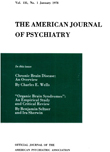Psychometric Evaluation of Children with Familial Dysautonomia
Abstract
A battery of objective psychological tests was administered to 25 children with familial dysautonomia and to ten unaffected siblings. Although the children with dysautonomia were able to achieve, on the average, an intelligence quotient within the low average range, comparison with the unaffected siblings lings indicated significant mental impairment. Of all the subtests given, the dysautonomic children scored best in "similarities," particularly those who were nine years old or older, indicating an ability to think conceptually.
Of 19 dysautonomic children, only two have been able to maintain a normal position in school. Factors associated with the disease other than intelligence have probably contributed to this poor performance.
Access content
To read the fulltext, please use one of the options below to sign in or purchase access.- Personal login
- Institutional Login
- Sign in via OpenAthens
- Register for access
-
Please login/register if you wish to pair your device and check access availability.
Not a subscriber?
PsychiatryOnline subscription options offer access to the DSM-5 library, books, journals, CME, and patient resources. This all-in-one virtual library provides psychiatrists and mental health professionals with key resources for diagnosis, treatment, research, and professional development.
Need more help? PsychiatryOnline Customer Service may be reached by emailing [email protected] or by calling 800-368-5777 (in the U.S.) or 703-907-7322 (outside the U.S.).



